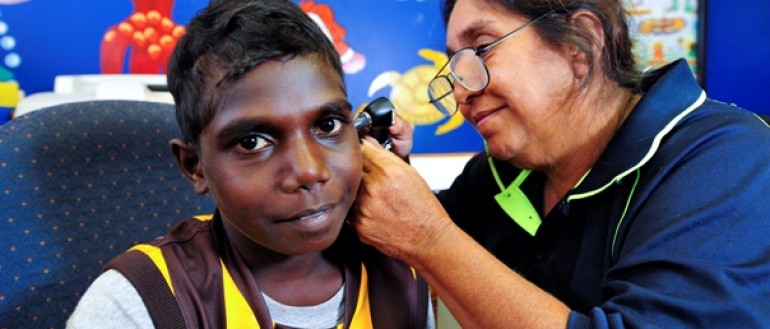Aims:
Our primary aim is to determine whether a watchful waiting treatment approach is non-inferior to immediate antibiotic treatment in achieving clinical resolution of acute otitis media (AOM) at day seven in Indigenous children living in geographic areas with a low risk of Chronic Suppurative Otitis Media (CSOM).
Secondary outcomes of the study will include:
- comparison of cost effectiveness of the two approaches
- exploration of attitudes of parents/ carers and health care providers to the two approaches
- exploration of parents/ carers and health care providers experience of the research process and their views on the translation of the research findings into practice.
Objectives:
- Is a watchful waiting treatment approach non-inferior to immediate antibiotic treatment in achieving clinical resolution of AOM at day 7 in Indigenous children living in geographic areas with low risk of CSOM?
- Is watchful waiting in the management of AOM in Aboriginal children at low risk of CSOM more cost effective than immediate antibiotic prescription?
- What are the attitudes of parents and carers and health care providers to the two AOM management approaches (watchful waiting or immediate antibiotic treatment)?
- What are the attitudes of Indigenous parents and carers and health care providers to the research process and its findings?
Summary:
Otitis media refers to inflammation/ infection of the middle ear space causing illness and hearing loss. In developed countries, most children with acute otitis media (AOM) will improve spontaneously and immediate antibiotic treatment confers only a modestly decreased duration of pain and fever.
In Indigenous children, the clinical course and long term adverse sequelae of otitis media (OM) are more severe than in non-Indigenous children. Immediate antibiotic treatment is recommended for Indigenous children with AOM who live in remote areas.
There is scant evidence to inform the most appropriate treatment approach for the 75% of Indigenous children who do not live in remote settings and who are considered to be at lower risk of these sequelae.
We will use a non-inferiority randomised controlled trial (RCT), complemented by a qualitative process evaluation to provide the best evidence for management of a common clinical problem in urban Indigenous children. We will address two NHMRC priorities for 2012: Indigenous health; and hearing priorities. Our investigator team includes two Indigenous researchers and staff from three Aboriginal health services who have contributed to this proposal from its early stages.
We will examine the feasibility of translating this evidence into practice through interviews with health care providers and Indigenous parents and carers during which we will also explore attitudes towards the research findings and methodology.
Chief investigators:
- Professor Jennifer Reath, University of Western Sydney
- Dr Hasantha Gunasekera, University of Sydney
- Professor Amanda Leach, Menzies School of Health Research
- Dr Penelope Abbott, University of Western Sydney
- Dr Deborah Askew, Queensland Health
- Associate Professor Federico Girosi, University of Western Sydney
- Associate Professor Kelvin Kong, University of Newcastle
- Doctor Chelsea Bond, Queensland Health
- Associate Professor Wendy Hu, University of Western Sydney.

